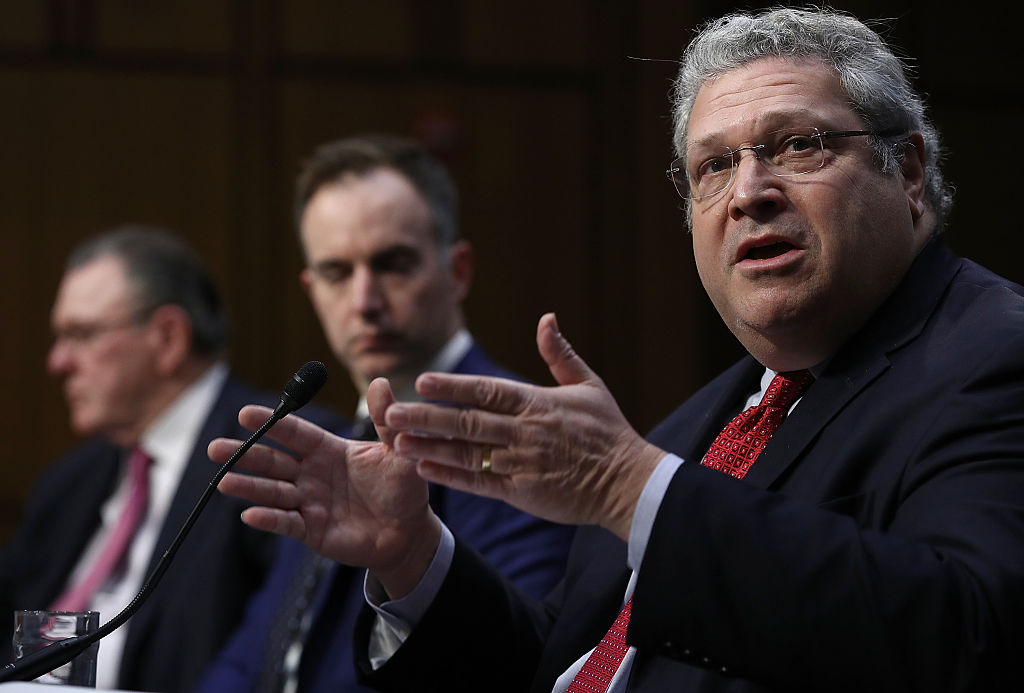A liberal order is not natural. Robert Kagan admits as much in his new book, The Jungle Grows Back, when he writes that the ‘the creation of the liberal order has been an act of defiance against both history and human nature’. Nor is a liberal order an ‘order’, or liberal in nature. It is a sort of hegemonic or imperial peace.
Nothing wrong with that, of course; peace, any peace, is important. Unfortunately, it is the liberal part, which causes the problem. An internationalist, utopian worldview, liberalism is full of crusaderly zeal, constantly ‘going abroad in search of monsters to destroy’. Liberal internationalists badly want to shape the world. When given the chance, they do manage to shape the world, very badly indeed.
In two other new books, John Mearsheimer and Stephen Walt further explore the related failures of post-Cold War liberalism and American grand strategy. And all three books seek to explain the enigmatic rise of Donald Trump. Whether Trump is a foreign policy realist himself is a matter of considerable debate, but it is irrelevant in the greater scheme of things. To attribute the changes of American foreign policy to one individual is objectively and empirically fallacious. Trump is an effect, not the cause, of the last quarter-century of liberal utopianism.
Kagan is fairly straightforward about what the US should do next. Yes, the people are against utopian failed adventures. Yes, the relative power of the United States is declining, due to age, losses of blood and treasure, misplaced priorities, and the quasi-imperial enforcement of law and order across the globe. But the US needs to continue with this Sisyphean strategy, and mustn’t be fatalistic in the face of unanticipated failure. How dare the realists argue for restraint after a quarter-century of failure and folly in nation-building and liberal democracy promotion.
Back in real life, Mearsheimer’s The Great Delusion claims that liberalism itself is paradoxical. It supports tolerance, but it is a universalist paradigm, deeply committed to borderless values. There cannot be any compromise or cooperation, because everything, everywhere is an existential battle. This causes conflict both at home and abroad. Domestically, liberalism divides a nation into good and bad people, and leads to a clash of cultures. Internationally, it leads to never-ending wars.
‘Liberal states have a crusader mentality hardwired into them that is hard to restrain,’ Mearsheimer argues. As liberalism prizes the concept of inalienable or natural rights, committed liberals are ‘deeply concerned about the rights of virtually every individual on the planet’. This universalist logic leads to liberal states fight endless wars, and ‘collide with nationalism, which inevitably wins’.
In The Hell of Good Intentions, Walt agrees that the bipartisan ‘liberal/neocon’ strategy of liberal hegemony has failed. ‘The Clinton, Bush, and Obama administrations all made democracy promotion a central goal of US foreign policy and were confident that US power could reinforce a powerful secular trend.’ But this idea of promoting democracy and creating liberal order in Balkans, Afghanistan and Middle East through regime change was delusional. Changing an entire system of governance by force, regardless of history and culture, creates a permanent conflict. It also turns allies into freeriders. ‘Instead of welcoming US leadership, allies took advantage by free-riding, adversaries repeatedly blocked US initiatives, and hostile extremists found different ways to attack, divert, and distract.’
As Walt and Mearsheimer both suggest, the three observable pillars of liberal hegemony were democratic peace theory, economic liberalism, and liberal institutionalism. The theory of perpetual democratic peace is disproven by recent history, and resulted in Middle East wars and a revanchist Russia. Economic liberalism led to lopsided globalisation, and the empowering of China at the cost of Western working class. And liberal institutionalism was absurd to begin with. No institution can succeed without an enforcer, and the policies of the enforcers — the great powers which are the primary actors of world politics — reflect their relative power and interests.
These flawed strategies led to quagmires in Afghanistan and Iraq. They led to argumenta ad passiones that made Libya a hub of human trafficking, tribal and sectarian civil war, and the mass migration that has led to the rise of ultra-nationalists in Europe, and arguably even Brexit. They led to the expansion of NATO and the EU, and thence to the resurgence of a revanchist Russia. Trillions of dollars, and thousands of lives, have been wasted, and all for an uncertain gain which even the liberal and neoconservative elites cannot define. The realists who prudently opposed the Iraq and Libya interventions suggested a strategy of Offshore Balancing. Walt restates that argument in the final section of his book.
Walt and Mearsheimer refuse to call Trump a master in realpolitik, and rightly. Trump is no Palmerston or Metternich. He doesn’t care about ‘relative gains’ and cooperation. But he does understand mercantile instincts and brute force. He is the first post-Cold War president to have refused to accept America’s relative decline and has sought to reverse the course. Somehow, he has broken the status quo.
Trump changed the goals of engagement against ISIS from attrition to annihilation; human rights be damned. He pressured China’s growth until it flatlined, forced Canada and Mexico to accept humiliating trade deals, and changed Europe’s balance of power, by backing Eastern and Central Europeans against both Moscow and the Brussels-Berlin axis. Trump may not have read a single word about Britain’s imperial grand strategy, but the resemblance to his overarching mercantile instinct and strategic similarities is unmistakable.
For realists, Walt and Mearsheimer are both surprisingly optimistic. But I wonder if they underestimate whether the EU, as a liberal empire, could challenge American hegemony in the near future. American realists cannot imagine a future in which a united Europe throws its weight behind China or Russia to balance the US. Nor am I confident that there will be no more liberal wars. As Walt rightly points out, the instinctive ‘Do something!’ emotion is extremely high among Americans. Cold, amoral realpolitik is a hard sell, especially in this age of social media. Public emotion and an activist, ideologically-charged foreign policy elite are incompatible with a rational, restrained, and realist grand strategy.
So far, a better analysis of the Trump phenomenon remains that of the grand old man of Western statecraft Henry Kissinger, himself classical realist:. ‘I think Trump may be one of those figures in history who appears from time to time to mark the end of an era and to force it to give up its old pretences. It doesn’t necessarily mean that he knows this, or that he is considering any great alternative. It could just be an accident.’
Still, Walt and Mearsheimer provide a much-needed explanation of American overreach. They also sketch the way forward, through a strategy of restraint and balance of power. The return of the big bad days of great power rivalry was inevitable after a quarter-century of liberal utopia. As Kagan says, internationalist liberalism is an unnatural construct, by definition against nature.
Sumantra Maitra is a doctoral researcher at the University of Nottingham.


















